Have you ever taken the Enneagram test? If you don’t, you could be missing a key piece of the puzzle when trying to understand your dating behavior. Knowing your own Enneagram—and maybe that of a significant other or romantic interest—can be like slotting that final piece into a jigsaw.
So what exactly is the Enneagram? Well, it categorizes people into nine distinct but interconnected personality types based on underlying motivations, fears, and outlooks. It gives us a colorful, forensic look into the habits and thought processes behind our choices.
The Enneagram Type Compatibility Theory can be hugely insightful when deciphering why you are drawn to certain people on dating apps and finding out whether you and a potential partner will (or won’t) be compatible as a couple.

So how exactly can knowing your partner’s Enneagram type affect your relationship? The Enneagram may give insight into the dynamics of your romantic partnership and point you toward ways to strengthen it.
And it’s not only helpful to know your Enneagram type for a relationship’s compatibility capabilities–the Enneagram system heightens our awareness of our boundaries, sensitivities, and weaknesses, so knowing your type might help you understand yourself and connect with others with compassion.
The nine Enneagram Types are as follows:
- Type 1: The Reformer
- Type 2: The Helper
- Type 3: The Achiever
- Type 4: The Individualist
- Type 5: The Investigator
- Type 6: The Loyalist
- Type 7: The Enthusiast
- Type 8: The Challenger
- Type 9: The Peacemaker
Understanding your Enneagram personality type may be valuable in the dating app world! To find out your Enneagram type, click here and keep scrolling for our latest Enneagram Type Compatibility blogs.
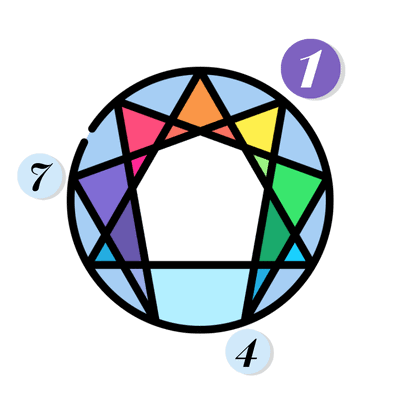
1. The Reformer
Reformers are those who prioritize fairness and order. Their motivation stems from an internal need to do the “right” thing by others and deny any and all responsibility for their actions. They put too much pressure on themselves and others in an attempt to achieve perfection, which may have the opposite effect.
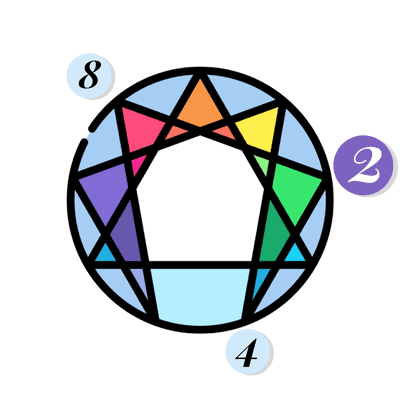
2. The Helper
The Helpers are known for being reliable and supportive of those around them. Their drive originates from an insatiable craving for constant affirmation and attention. They give so much of themselves that they forget to care for their wants and needs. They have an intense need for acceptance and a crippling fear of rejection, so they’ll do almost everything to guarantee their peers accept them. In their desire to help others, they often put themselves last and don’t create healthy boundaries.
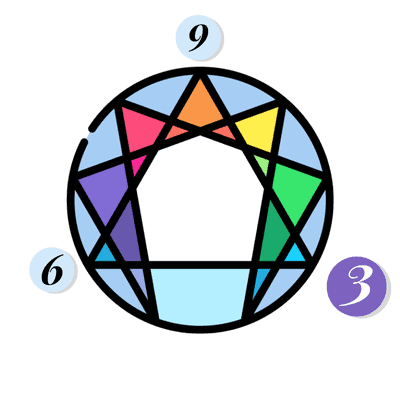
3. The Achiever
Success comes easily to those who fall under The Achiever enneagram. The urge to succeed, or at least seem to succeed, motivates them relentlessly. In other words, they take all precautions necessary to ensure success. They are always worried about what others will think of them and don’t want to look foolish.
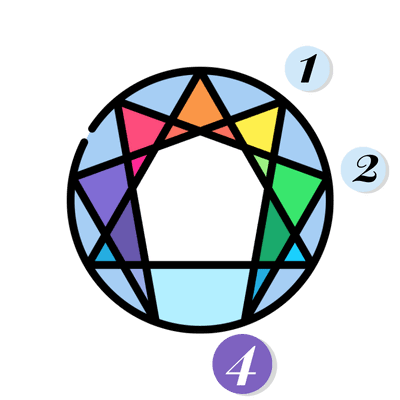
4. The Individualist
The urge to stand out and be special drives Individualists, who despise conformity and routine. Besides this, they place a premium on experiencing every one of their feelings deeply, which means mood swings and fear of fault might be a problem for them.
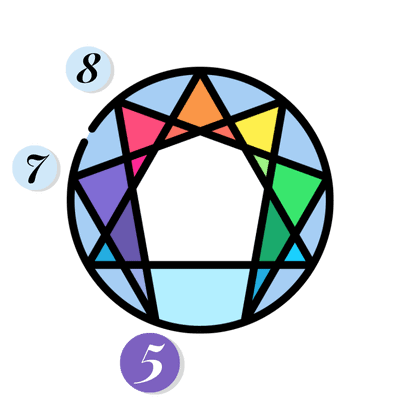
5. The Investigator
It’s no secret that The Investigator, sometimes called a scientist or a professor, has a passion for knowledge. People like this prefer to keep to themselves and avoid close relationships since they are always trying to preserve energy so they can expend it on learning more. They have a reputation for being aloof and introverted.
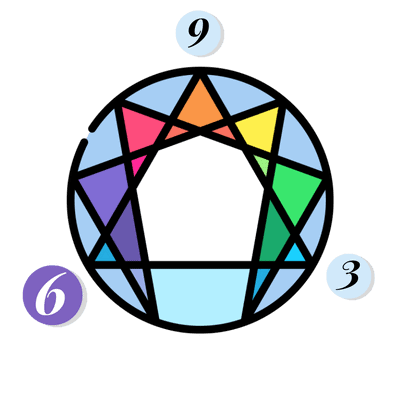
6. The Loyalist
Many Loyalists are driven by insecurities and worries about the future. Friendship and loyalty are highly valued, yet they always tend to anticipate the worst. They worry easily if they haven’t planned for the worst possible scenario; therefore, they always try to be equipped for whatever bad situation could happen.
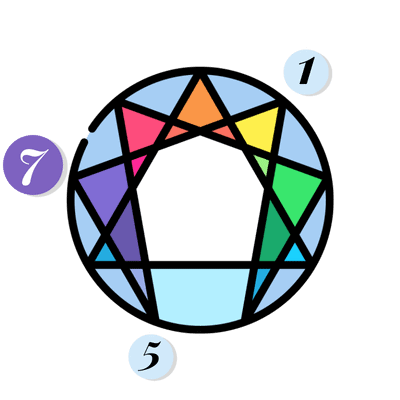
7. The Enthusiast
One who always sees the glass as half full, Enthusiasts act on impulse and are driven by a desire to experience joy. They are generally full of boundless energy and resist being tied down. They avoid any emotional distress by keeping themselves constantly occupied and entertained.
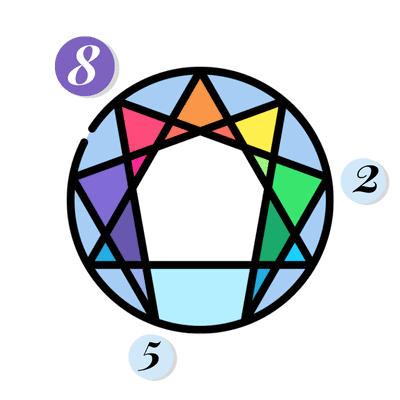
8. The Challenger
In order to keep from seeming weak and vulnerable, Challengers are driven by an overwhelming urge to demonstrate their superiority over everyone around them constantly. One could call them protectors, and it’s safe to say that they never lack direction in terms of what they desire. They are leaders but can’t help themselves from wanting to control everything and everyone around them.
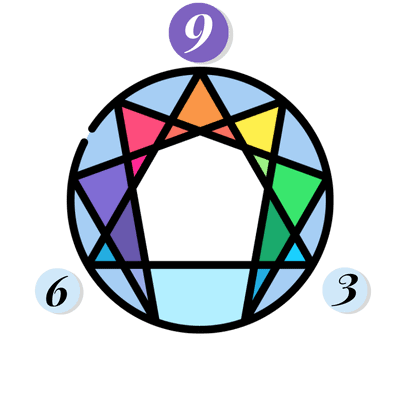
9. The Peacemaker
Peace, comfort, and calm are highly prized by The Peacemaker. Their drive comes from a desire to avoid confrontation at all costs. They are flexible and often give up control in order to ensure the happiness of others around them.
Enneagram Compatibility FAQ
The Enneagram has nine distinct personality types, each having its own outlook on the world and approach to interpersonal relationships. The Enneagram’s nine personality types are not original to the field of psychology but may be found in a wide variety of works. Nonetheless, the advantages and disadvantages of each personality are spelled out in this approach.
The origin of the diagram is murky, although it likely predates even the Greek mathematicians. Around 1305, a Franciscan monk in Mallorca called Ramon Lull utilized it to synthesize the understanding of Christians, Islam, and Judaism, and it made its first appearance in literature after that.
While there are similarities in the Christian past dating back to the “Desert Fathers” during the first two centuries, its development as a system of psychological kinds did not begin until the late 1960s. A list of eight or nine thinking patterns was provided as examples of what might stand in the way of one’s spiritual development.
The value of knowing your Enneagram type is in the amount of insight it provides into our unique character structure, way of thinking, and emotional and behavioral patterns it reveals. This gives us a chance to learn more about ourselves and our motivations, allowing us to make better decisions about what helps us and what doesn’t.
The Enneagram is being used by a growing number of people all over the world as a tool to better understand and empathize with those they love. Understanding the other person’s perspective, worries, and needs can help you be there for them and not take things so personally, which is a huge asset in any relationship.
Personality conflicts may arise even when there is love between two people, and we may avoid hurting the people we care about by not responding to them instinctively based on our type structure and instead focus on being present in the moment and accepting responsibility for how our actions and words affect those closest to us. The Enneagram may be a helpful tool in developing the capacity to communicate with others who differ from us.
Yes! There are tests you can take online to learn your Enneagram type. You can click here to take the test!
